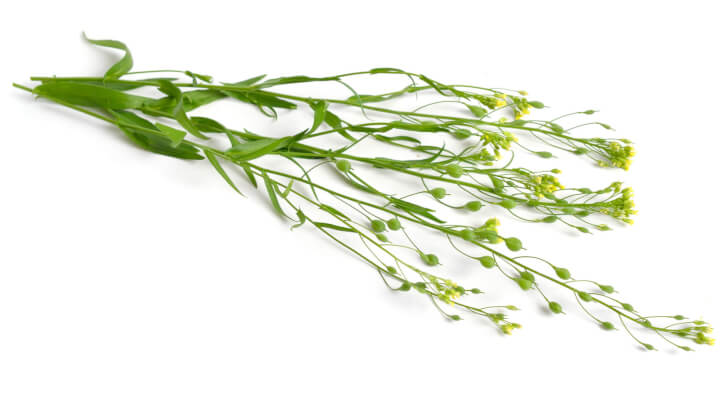As demand for omega-3s EPA and DHA continues to rise and pressures on fish stocks increase, alternative sources are being explored from algae, copepods and krill to genetically-engineered oil seed crops, such as canola and camelina.
Professor Johnathan Napier, PhD, and his team at Rothamsted Research in Harpenden, UK have been developing camelina with increased levels of EPA and DHA for over two decades. The team has also carried out multi-year field trials, multiple feeding studies using the DHA+EPA camelina oil in different fish species including salmon, and human clinical studies to demonstrate equivalent effects to fish oil.
In a 2015 paper in the European Journal of Lipid Science and Technology, Prof. Napier stated: “Since camelina as an oilseed crop can easily yield 0.75 ton of oil/ha, then a GM oil containing similar levels of EPA and DHA to that found in fish oils could make a significant contribution to off‐setting oceanic sources. For example, 200,000 ha of GM camelina could produce 150,000 metric tons of oil, which could serve as a direct replacement for fish oils in aquafeed, representing 15% of the global oceanic harvest of these oils.”
Licensing
The new license for Yield10 allows the company to implement a plan to use engineered Camelina sativa to commercially produce omega-3 oil and meal products catering to the aquafeed, petfood and nutritional markets for omega-3 fatty acids, according to a press release. The new licensing builds on an established collaboration between the organizations that began in late 2020.
“Over the last three years, the Yield10 team has provided us with expertise and support as our team has advanced the development of engineered camelina from field testing to planting at multi-acre scale to produce omega-3 oil,” said Professor Angela Karp, CEO of Rothamsted Research, the longest-running agricultural research institute in the world.
“Yield10’s innovations and capabilities in camelina are impressive, and successful commercialization of this technology could have significant benefits, offering sustainable production of an oil essential for nutrition and wellness to consumers, as well as providing crop diversification to growers. We look forward to the commercialization of omega-3 oil and meal products by Yield10 in the years ahead.”
Recent timeline of achievements for the camelina omega-3 program
Over the past 12 months, Yield10 has achieved a number of important milestones with the omega-3-rich camelina, including planting omega-3 (EPA) camelina at the 50 acre-scale in Chile in the fall of 2023 to produce oil for use in business development activities. The crop was harvested in earlier this year.
In October 2023, Yield10 signed a non-binding Letter of Intent with global aquafeed producer BioMar Group to form a partnership to commercialize camelina engineered to produce omega-3 oil for use as a high-quality supplement to the scarce supply of marine long-chain fatty acids used in aquafeed.
In November 2023, USDA-APHIS determined that Yield10’s glufosinate tolerant camelina and its stacked herbicide tolerant camelina may be planted and bred in the United States in response to two RSR packages submitted by Yield10.
In March of 2024, USDA-APHIS responded positively to Yield10’s announced filings for two requests for a Regulatory Status Review with USDA-APHIS’s Biotechnology Regulatory Services under the SECURE Rule for proprietary camelina varieties containing genes enabling the plant to produce the EPA and EPA+DHA components of omega-3 oil.
In the spring of this year, the company planted EPA and EPA+DHA omega-3 camelina to scale up seed. It is also field testing herbicide tolerant omega-3 camelina lines to guide selection of commercial quality lead and back-up lines.
“Enabled by the Rothamsted technology, we are on a promising path to commercializing elite omega-3 producing varieties of camelina that combine good agronomics in the field while also producing high-value, high-purity omega-3 oils possessing very attractive economics,” said Oliver Peoples, PhD, president and CEO of Yield10 Bioscience.
“In 2024, we are positioned to execute on the scale-up of omega-3 producing camelina and to submit key regulatory filings with the goal of being ready for an initial commercial launch into the oil and meal markets. We also look forward to improving the current camelina varieties over time particularly with the deployment of herbicide tolerance and other performance traits.”
In consideration for the commercial license, Yield10 is expected to pay certain license fees, future milestone payments and royalties based on commercialization of Rothamsted’s omega-3 technology.
